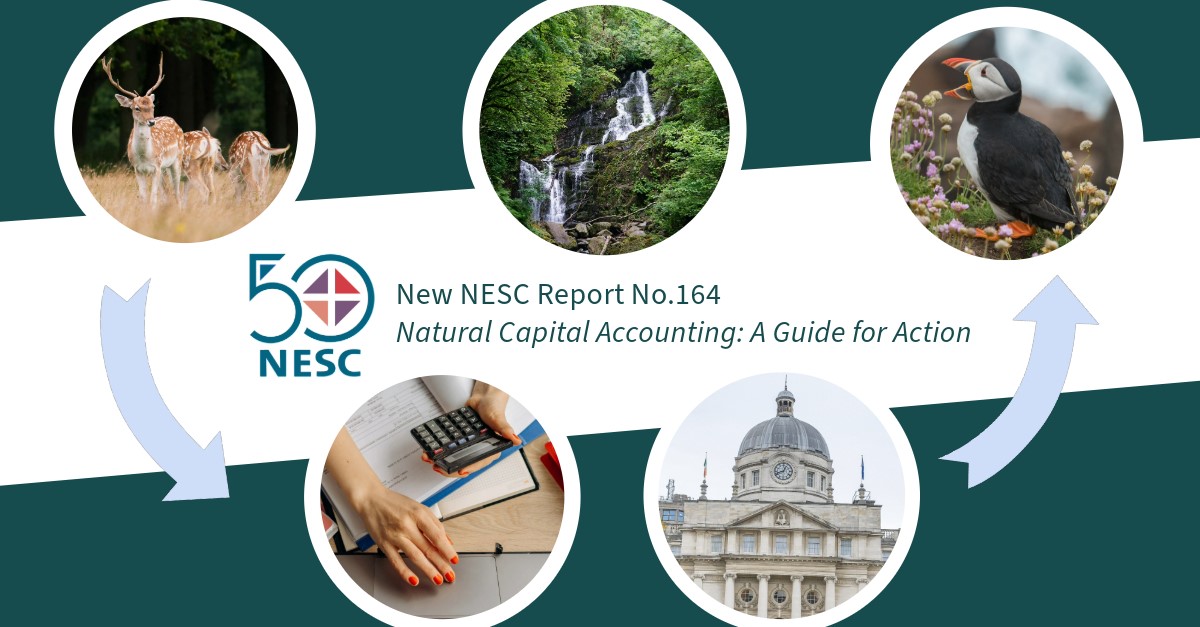You are here: Home > News & Events > Council Report No.164 – Natural Capital Accounting: A Guide for Action
Council Report No.164 – Natural Capital Accounting: A Guide for Action
- 18 January 2024
- Topics: Economic Environment
- Types: Press Releases

- Today NESC publishes Natural Capital Accounting: A Guide for Action as part of its 50th-year work programme.
- With biodiversity loss and climate change challenges rising, the report emphasises the role of natural capital accounting in valuing, recognising and integrating nature into Irish policy decision-making using a UN-standardised approach.
- NESC sees a significant opportunity for Ireland to systematically account for nature’s risk and value but highlights risks if natural capital accounting isn’t actively engaged and integrated into policy decisions.
18 January 2023: As part of its 50th-year work programme, the National Economic and Social Council (NESC) has published a new report, Natural Capital Accounting: A Guide for Action (Council Report No. 164).
We take for granted that our lives depend on nature and what it provides – water, air, soil, trees, peatland and woodlands and a vast range of animals and insects and the food, fuel and medicines they become. A new report from NESC, Natural Capital Accounting: A Guide for Action (Council Report No.164) sets out how to go about considering and valuing these often invisible services that nature provides us.
The report focuses on a key internationally used tool: natural capital accounting. In short, this integrates environmental data into the system of national accounts for economic activity. It can help Ireland to better account for nature. In this report, the Council finds that natural capital accounting is an important part of the solution to working more closely with nature.
This report provides detailed examples, from Ireland and across many countries including the UK and the Netherlands that are using natural capital accounting to make nature more visible in national accounts. The report highlights how understanding what nature contributes can help all of us, and crucially, people within the policy-making system, to become more aware of what needs to be done to measure nature’s contribution to society and the economy so it can be better protected. It describes the types of work and skills, such as data sharing and geographical mapping, needed to help us value and nurture nature and its services. It outlines the work underway by the CSO in building Ireland’s ecosystem accounts.
Dr Jeanne Moore, lead author of the report highlighted one area of opportunity: using natural capital accounting to support a just transition in agriculture and land use. She noted that there are increased efforts and work underway in development of payment for ecosystem services for farmers such as protecting birds and other species. However, more ecological training must be available for farm advisors and payment systems which reward and incentivise efforts to protect and improve nature must be improved and made more widely available.
She argued that developing better tools to account for nature can be useful in many other ways but will only deliver improvements more broadly if they are taken up and used in Government departments, agencies and local authorities. Just increasing the data is not enough, it needs to be used as a key tool to inform decision-making. The measures and indicators can also be used to improve how we measure our performance as a country, for example in the National Wellbeing Framework and to help restore Ireland’s biodiversity and protect against climate change.
On the publication of the report, Dr Larry O’Connell, Director of NESC, added that “with increased efforts to protect and restore biodiversity, we will have mandatory EU reporting requirements by 2026 and there is strong support among experts and stakeholders, that that now it the time to invest in valuing and accounting for nature in the Irish policy system. The Government requested advice on how to make tangible progress now and this report provides clear guidance and a set of actions and recommendations“.
Read the full report HERE.
ENDS.
For further information, contact:
Danielle Fitzpatrick
e: dfitzpatrick@carrcommunications.ie
t: 083 8263716


